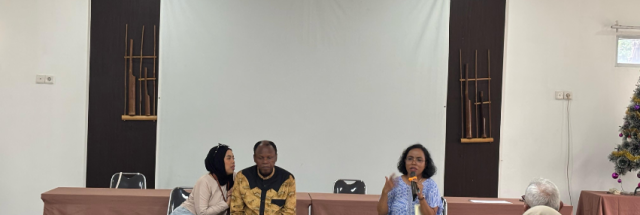
Bandung, February 4, 2025
Allow me to introduce myself. I am Obertina Johanis, a Pastor at Gereja Kristen Pasundan (GKP). I work full-time at WCC Pasundan Durebang, providing support to victims of gender-based violence.
The film Beyond Forgiving feels quite personal to me as an Indonesian Christian woman who has been a victim of religion-based violence—specifically, the closure of the church and the cessation of worship services at GKP Dayeuhkolot since 2005, for a total of 20 years. Based on this experience, there are four important points I want to highlight from the Beyond Forgiving film held in Bandung on February 4, 2025.
Demonization of Groups
In this film, Letlapa mentions that when the order to kill was given, he demonized the target—in his case, the white government. They were regarded as evil people with no human face. In our experience at GKP Dayeuhkolot, a similar situation occurred. The people who attacked and vandalized our church did not see us as human, but rather as deviant and evil.
When we remove the human face and see others merely as objects, we engage in objectification. Combined with a misguided and evil understanding, demonization occurs, and the potential for violence increases.
Identification
Gin taught me the importance of identifying the perpetrators of violence. In the film, Gin stated that he wanted to meet the person responsible for ordering the mass killing that resulted in the death of his daughter, Lindy. For Gin, it is important to carry out identification so that he does not generalize that all black people are evil and murderers.
At GKP Dayeuhkolot, we tried to do the same. Even though the people who attacked and vandalized the church building wore certain clothing and chanted "Allahu Akbar," we made an effort not to generalize by saying that all Muslims are evil and unjust. Later, we learned that the perpetrators were the groups Barisan Anti Pemurtadan (BAP) and Aliansi Gerakan Anti Pemurtadan (AGAP).
Storytelling as a Healing Process
Throughout the film, Letlapa repeatedly mentions that storytelling is a healing process. That is why Letlapa and Gin are willing to travel the world and share their stories. They want many people to be inspired and to do the same. In my personal experience, storytelling or narrating the violence we experienced has been my way of recovering from the severe trauma caused by that violence.
Forgiving with Full Awareness
In one scene, Gin says that he consciously chose to forgive Letlapa. On the other hand, Letlapa also stated that he consciously accepted the forgiveness given by Gin. Often, we see forgiveness as something easily and cheaply given and received. We sometimes forget that both giving and receiving forgiveness are actions consciously chosen by an individual.
Gin mentioned that his process of forgiveness began when he realized that Letlapa also carried wounds from the unjust actions committed by the white government. That is why he ordered the killing. Gin strongly stated, “When you stop looking at your own wound, you start to realize other people’s wounds.”
Witer: Obertina M. Johanis (GKP)
Editor: Atri Budi S

